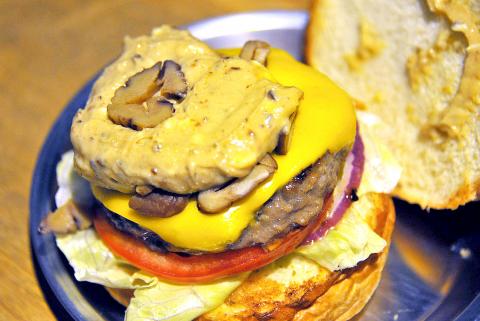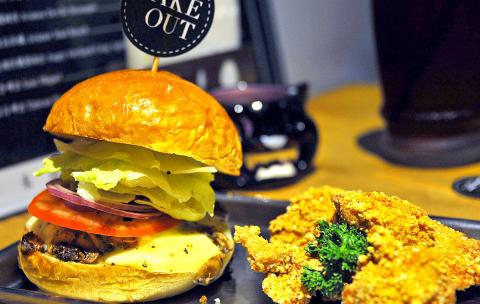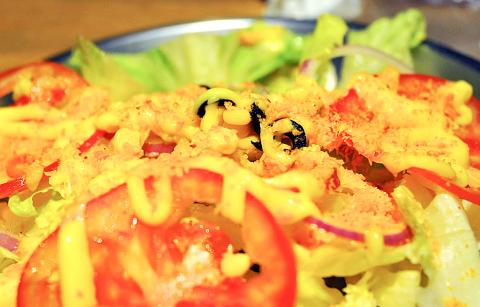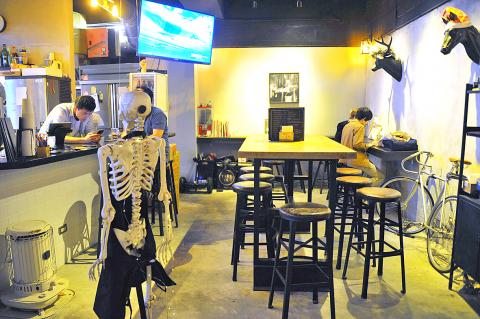The first thing I did when I walked into Take Out Burger, a small bar-style joint in the Liuzhangli (六張犁) area, was to try and figure out the decorations in the otherwise industrial-chic space.
Visitors are greeted by a skeleton in a black dress standing in the middle of the stone floor (staff says they change its outfit every now and then), and there are black horse and deer busts on the wall, one wearing a Santa hat with Chinese-style patterns and the other a silver wig. The garbage area is guarded by a large Moai statue, its stern presence reminding you to put the recyclables in the right bin.
It’s curious why this place is called Take Out — burgers and fried food are best eaten in the store, otherwise they get cold and soggy. Anyhow, the menu is eclectic, but not as offbeat as the decor. While the featured burger is an intriguing sweet Tianjin chestnut cream cheese creation (NT$200), the rest of the burgers are pretty tame, including spicy Mexican (NT$200), onion ring spicy meat sauce (NT$220) and the ubiquitous peanut butter burger (NT$180).

Photo: Han Cheung, Taipei Times
The store seems to rotate the featured burger monthly, and I’m glad I didn’t come last month because it was laden with parsley (which I personally abhor). They also have a wonderful selection of craft beer including Brooklyn, North Coast and local brewery Alechemist. There’s also Taiwan Beer for the less choosy.
I’ve fallen victim to novelty burgers before, but it’s still hard to resist ordering the sweet chestnut burger our of curiosity. To be fair to the restaurant, we also order the standard Mozzarella mushroom burger (NT$220). There are six sets — we choose B (NT$85) which comes with a drink and basil fried chicken, and E (NT$110) which comes with a drink and salad. Patrons can also add items a la carte to the burger and salad (between NT$20 and NT$60).
I’m biased against iceberg lettuce — it’s tasteless and watery — but it seems to be the the standard for side salads everywhere you go. It is topped with tomatoes, onions, corn, olives and what seems to be crumbled cheddar Doritos. I chose the mango dressing — which was too sweet as I had expected a little more tang. The dish overall was pretty pedestrian, although I enjoyed the Dorito toppings, which provided crunch, saltiness and a nice cheesy aftertaste to balance out the sweet dressing.

Photo: Han Cheung, Taipei Times
The sweetness overload continued with the chestnut burger as the cream cheese did not taste like cheese, but more like chestnut cream found on a cake. Coupled with the also sweet-leaning toasted brioche bun — which smelled pleasantly buttery and was crisp and firm on the outside — if felt like I was eating a dessert pastry instead. The generous handmade beef patty was excellent with just the right amount of juiciness and firmness, but its taste was overshadowed by the chestnut, which has strong overtones that linger on the palate.
The restaurant provides plastic gloves for those who don’t want to dirty their fingers — and trust me, you’ll need it for the chestnut burger.
This is why you never judge a restaurant by its novelty creations, because the Mozzarella burger was pretty enjoyable. It wasn’t anything special, but the flavors and textures made sense as a whole — and I could taste the bread and the meat for what they really were. Unfortunately, the patty was a little uneven, unlike the one in the chestnut burger. The mushrooms were the best feature — they were lightly seasoned (probably just pepper with a tiny dash of salt) and cooked just enough that they still retained firmness. Usually, mushrooms in burgers are softer and serve more as a complement, but these ones stood out, obvious in each bite.

Photo: Han Cheung, Taipei Times
Finally, there was the chicken — which, interestingly, tasted exactly like Taiwanese-style popcorn chicken (鹽酥雞), from the use of basil to the crunchy breading. Actually, it was much better than the stuff you get from the street, coming in larger pieces and the meat being much more succulent and juicy.
I probably should have tried one of their spicy meat sauce burgers, which many people have praised on the Internet. Maybe I’ll come back when they have another featured burger that catches my eye.

Photo: Han Cheung, Taipei Times

As Taiwan’s second most populous city, Taichung looms large in the electoral map. Taiwanese political commentators describe it — along with neighboring Changhua County — as Taiwan’s “swing states” (搖擺州), which is a curious direct borrowing from American election terminology. In the early post-Martial Law era, Taichung was referred to as a “desert of democracy” because while the Democratic Progressive Party (DPP) was winning elections in the north and south, Taichung remained staunchly loyal to the Chinese Nationalist Party (KMT). That changed over time, but in both Changhua and Taichung, the DPP still suffers from a “one-term curse,” with the

William Liu (劉家君) moved to Kaohsiung from Nantou to live with his boyfriend Reg Hong (洪嘉佑). “In Nantou, people do not support gay rights at all and never even talk about it. Living here made me optimistic and made me realize how much I can express myself,” Liu tells the Taipei Times. Hong and his friend Cony Hsieh (謝昀希) are both active in several LGBT groups and organizations in Kaohsiung. They were among the people behind the city’s 16th Pride event in November last year, which gathered over 35,000 people. Along with others, they clearly see Kaohsiung as the nexus of LGBT rights.

Jan. 26 to Feb. 1 Nearly 90 years after it was last recorded, the Basay language was taught in a classroom for the first time in September last year. Over the following three months, students learned its sounds along with the customs and folktales of the Ketagalan people, who once spoke it across northern Taiwan. Although each Ketagalan settlement had its own language, Basay functioned as a common trade language. By the late 19th century, it had largely fallen out of daily use as speakers shifted to Hoklo (commonly known as Taiwanese), surviving only in fragments remembered by the elderly. In

Dissident artist Ai Weiwei’s (艾未未) famous return to the People’s Republic of China (PRC) has been overshadowed by the astonishing news of the latest arrests of senior military figures for “corruption,” but it is an interesting piece of news in its own right, though more for what Ai does not understand than for what he does. Ai simply lacks the reflective understanding that the loneliness and isolation he imagines are “European” are simply the joys of life as an expat. That goes both ways: “I love Taiwan!” say many still wet-behind-the-ears expats here, not realizing what they love is being an